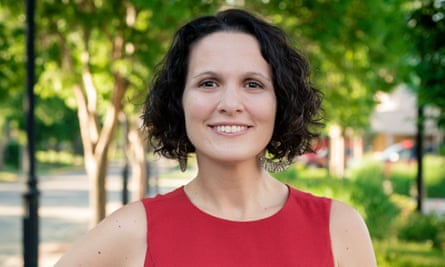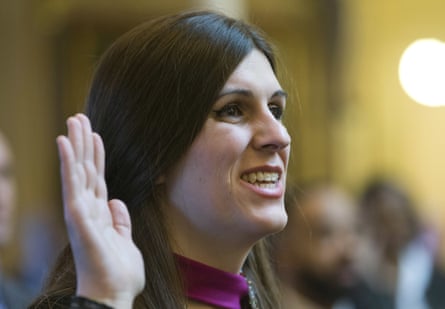On 20 January last year, I cried. I vaguely remember shouting at the Obamas on TV to go right back to the White House. I was a mess of frustration and anxiety. I was one of millions.
It was an inauspicious start to a new year – one that changed me, changed many of us.
On an impulse, I volunteered to be bus captain for the second bus leaving Cincinnati for the Women’s March in Washington. That weekend, at the rally preceding the march, I could hear but not see Gloria Steinem over the crowd. On tiptoe, I could see pink hats in all directions, a sea of women pressing together; the crowd contracted tighter.
Eventually, the rally segued to march. The crowd spilled forth on to sidewalks and roads. I began to breathe, full, deep breaths. Women around me began singing: “We will not go away. Welcome to your first day.”
It was a strange birth in strange times.
The women around me were going to change our country. They would run for office.
It became a year with more social gatherings than I’d ever known. I heard about a woman at a local nursing home who formed an Indivisible group – the group’s average age was 86. One local resident organized dozens of us to make hundreds of valentines to deliver to Congressman Brad Wenstrup to assert our priorities: “I love clean air and water!” “I love affordable healthcare.”
My friends’ children and pets nearly disappeared from their Facebook feeds, replaced with calls to action from local Together We Will groups. Our forms of resistance took up any remaining time that wasn’t dedicated to work or our children.
I was already a volunteer with Moms Demand Action for Gun Sense in America, and watched in horror as a concealed carry expansion moved through our state legislature, allowing concealed firearms in daycares and some municipal properties. My own tiny south-west Ohio city of Wyoming used provisions in the new law to opt-in for concealed carry on municipal properties.
One woman in my city started a petition. I joined with others to organize vocal protest, and the city resolution was rescinded within a month. We felt a bit of power restored.
Still, we also felt someone who cared about the things we cared about should run for our local city council.
My friends pointed at me.
Me? I felt uncomfortable with the idea of sweeping into a spotlight. I have spasmodic dysphonia, a neurological disorder, which makes my voice shaky – not great for speaking in public. But in this time of uncertainty, I began to feel like I’d sleep better at night if I were more involved. “You should run,” women I respect told me. They convinced me.

In 2017, thousands of other women across the US made the same decision.
Women got over worrying about being scared, too young or too old, too busy, or a single mother, or that people who look like them don’t win where they live.
My husband stayed up past midnight for months helping with my campaign. My children spent more hours canvassing with me than at soccer or gymnastics.
Among people outside my home, it was the women who showed up with the most tenacity – hosting events, carrying campaign literature around in their purses and talking their neighbors into voting for me. They coached me on getting over the awkwardness of touting my achievements. They amplified everything I did. Whatever doubts I’d had about running in the first place, they pounded it out of me with their sheer insistence that I must win.
On election night, in a race where the top seven would win seats, I climbed to third. A friend who’d been with me throughout, also won a seat. In many ways, she and I had taken the plunge together. We had believed in each other.
In December, I was sworn in. I wore a suffragette white dress under a blue blazer, with my grandmother’s brooch pinned to the lapel. My family, my team, were in the audience. I repeated the oath to uphold the constitution and our city’s charter. I bound myself to a duty I’d always vaguely acknowledged, but after a year of fighting against an onslaught of bad choices and straight injustice, those words became sacred.
I’d found my voice, and so did many others.
There was Tamaya Dennard, Cincinnati’s new councilwoman, who quoted Shirley Chisholm’s “If they don’t give you a seat at the table, bring a folding chair” so often that she brought her own red folding chair to her swearing-in.
Danica Roem, the first openly transgender state lawmaker in the country, won a seat in Virginia’s state legislature, ousting a two-decade incumbent who’d christened himself Virginia’s “chief homophobe”.
Hala Ayala, after organizing buses for the Women’s March, quit her cybersecurity job, ran for a state delegate seat in Virginia and with November’s election became one of the first two Latina women elected to the state’s house of delegates.
In Iowa City, Mazahir Salih won a council seat – the first immigrant to win a seat there.

Then, the new female mayors: Jenny Durkan, first female mayor in Seattle, Washington, in a century and the first openly lesbian woman to hold that office; Vi Lyles, the first female mayor of color for Charlotte, North Carolina; Nancy Rossi, first female mayor in West Haven, Connecticut, and so many other firsts.
As I took my seat behind a placard with my name and the word “councilmember”, I thought of my grandmother who’d been the age my daughter is now when the 19th amendment was ratified and women were granted the right to vote. I thought of my mom who’d always eagerly volunteered to work the polls, loved politics but never would have thought she could run for office. I thought about Hillary Clinton, about those 18 million cracks she’d hammered through the glass ceiling.
As 2018 dawns, I worry. I know so many people – but women especially – who spent all their spare hours last year fighting. I worry about fatigue. I worry that me too confessions will be used as an excuse to further exclude women in the workplace rather than simply making professional settings safer. I think of Rebecca Solnit’s words in the essay Grandmother Spider: “Some women get erased a little at a time, some all at once. Some reappear. Every woman who appears wrestles with forces that would tell her story for her, or write her out of the story, the genealogy, the rights of man, the rule of law.”
After the revolt comes the effort to silence, to tuck us away again.
But a record number of women plan to run for office in 2018. And as we begin another round in the resistance, I see even more women of all types choosing to run for governor, for Congress, for school board and city council, becoming organizers and campaign managers.
This year will be measured in more first campaigns, in women looking for mentors in those who have been at it for decades, linking arms as we demand more.
This year, I am filled with a sensation that would have seemed absurd a year ago: hope.

Comments (…)
Sign in or create your Guardian account to join the discussion